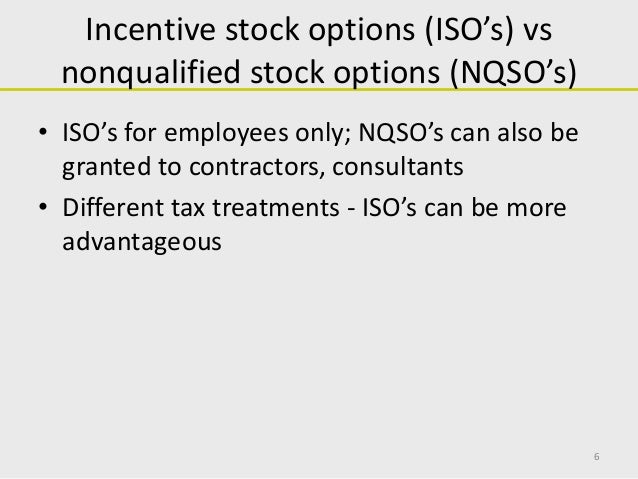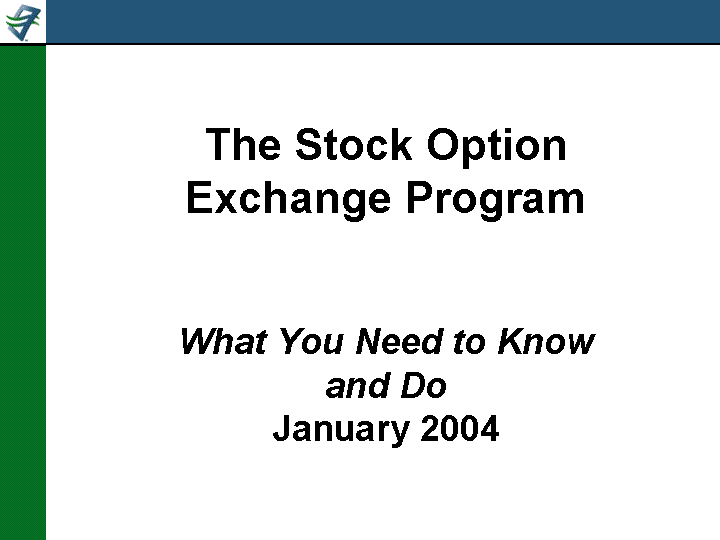Vested incentive stock options

Incentive stock options are a form of compensation to employees in the form of stock rather than cash. With an incentive stock option ISO , the employer grants to the employee an option to purchase stock in the employer's corporation, or parent or subsidiary corporations, at a predetermined price, called the exercise price or strike price.
Stock can be purchased at the strike price as soon as the option vests becomes available to be exercised. Strike prices are set at the time the options are granted, but the options usually vest over a period of time. If the stock increases in value, an ISO provides employees with the ability to purchase stock in the future at the previously locked-in strike price.
Options PoolThis discount in the purchase price of the stock is called the spread. ISOs are taxed in two ways: Income from ISOs are taxed for regular income tax and alternative minimum tax, but are not taxed for Social Security and Medicare purposes. Incentive stock options are reported on Form in various possible ways.

How incentive stock options ISO are reported depends on the type of disposition. There are three possible tax reporting scenarios:. Because you are recognizing income for AMT purposes, you will have a different cost basis in those shares for AMT than for regular income tax purposes.
Basics of Incentive Stock Options | Finance and Flip Flops
Accordingly, you should keep track of this different AMT cost basis for future reference. For regular tax purposes, the cost basis of the ISO shares is the price you paid the exercise or strike price.
For AMT purposes, your cost basis is the strike price plus the AMT adjustment the amount reported on Form line Form is a tax form used to provide employees with information relating to incentive stock options that were exercised during the year.
Employers provide one instance of Form for each exercise of incentive stock options that occurred during the calendar year. Employees who had two or more exercises may receive multiple Forms or may receive a consolidated statement showing all exercises. The formatting of this tax document may vary, but it will contain the following information:.
Ask The Expert - urisofod.web.fc2.com
If you sell your ISO shares after whichever date is later, then you will have a qualifying disposition and any profit or loss will be entirely a capital gain or loss taxed at the long-term capital gains rates. If you sell your ISO shares anytime before or on this date, then you'll have a disqualifying disposition, and the income from the sale will be taxed partly as compensation income at the ordinary income tax rates and partly as capital gain or loss.
Search the site GO. Updated September 08, To find this, multiply the fair market value per share box 4 by the number of shares sold usually the same amount in box 5 , and from this product subtract exercise price box 3 multiplied by the number of shares sold usually the same amount shown in box 5.
This compensation income amount is typically included on your Form W-2, box 1.
If it's not included on your W-2, then include this amount as additional wages on Form line 7. Calculating Adjusted Cost Basis on a Disqualifying Disposition Start with your cost basis, and add any amount of compensation.
What Are Incentive Stock Options (ISOs) - Taxation, Pros & Cons
Use this adjusted cost basis figure for reporting capital gain or loss on Schedule D and Form Get Daily Money Tips to Your Inbox Email Address Sign Up. There was an error. Please enter a valid email address. Personal Finance Money Hacks Your Career Small Business Investing About Us Advertise Terms of Use Privacy Policy Careers Contact.